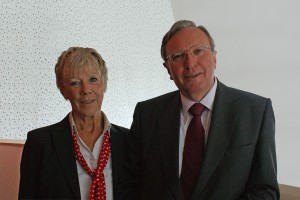29 May, 2012, by Francine Pickering
Working Capital for SMEs
Speakers: Professor Bob Berry, Boots Professor of Accounting and Finance, Nottingham University Business School and Linda Brentnall, Santander
Post by Francine Pickering, Ingenuity.
The “traditional” view in business is that working capital is a good thing. It keeps your business running and acts as a buffer in times of crisis.
But big business nowadays takes a different view, operating with negative working capital and happy to be able to squeeze enough of a short-term loan out of their suppliers.
That was a key lesson for the small business owners in the audience as Professor Bob Berry presented the implications of this for small businesses in a supply chain. In his experience of working with SMEs, they can easily wait twice as long to be paid as they have built into their business plan – and that can’t fail to have an impact on a business.
Bob gave three reasons for holding working capital:
- Transactional demand – it happens because that’s how your business works and you need it on hand.
- Precautionary demand – as a form of protection against the unexpected or hard times.
- Speculative demand – to be able to take advantage of opportunities.
Where you place your focus – stock, debtors, cash and equivalents – will be a balancing act depending on your priorities.
Bob’s advice to small businesses is to understand the environment that you are working within, especially if you supply larger companies and organisations.
Ensure that someone within your business has responsibility for monitoring and controlling your inflow, stock and outflow. The management of your working capital simply can’t be “someone else’s” responsibility. Remove weaknesses in your control system – if the person who chases overdue payments is the same one who monitors your debtors, they will be much more likely to know who to prioritise and who is likely to be awkward to deal with.
The presentation sparked lively debate with late payment and debtors striking a cord with many. One audience member raised the interesting question of how large organisations marry their proclaimed support for corporate social responsibility with a tendency to manage their own working capital through paying their suppliers late.
In many cases, it seems, this is simply down to a remarkable ability to hold two conflicting opinions at the same time. However, Bob Berry did point out that the ‘blue chip business might be persuaded that it is their interest for their suppliers to succeed – CSR can come to the forefront if it is in the big business’ interest.
For the small and medium-sized business, managing working capital is not about accounting formulae as much as it is about allocating responsibility and ensuring that working capital issues are factored into the day-to-day decisions within your business. Do that, and, not only do you improve your current situation, next time you approach the bank for additional finance, you’ve got a much stronger case
The audience said:
“More Bob Berry please.”
“Useful to understand the thought process of ‘blue chips’”
“Bob is a very good speaker with some interesting angles”
The Ingenuity Knowledge Exchange breakfasts are free and open to all business owners. The next event is on the theme of Building an Innovative Organisation and sees Dr Mat Hughes from Nottingham University Business School discussing how to organise your business to unlock its potential for innovation and entrepreneurship.
Professor Bob Berry, Nottingham University Business School
Santander Breakthrough Programme for SMEs
Building an Innovative Organisation – 10th July 2012 – free breakfast event
No comments yet, fill out a comment to be the first


Leave a Reply